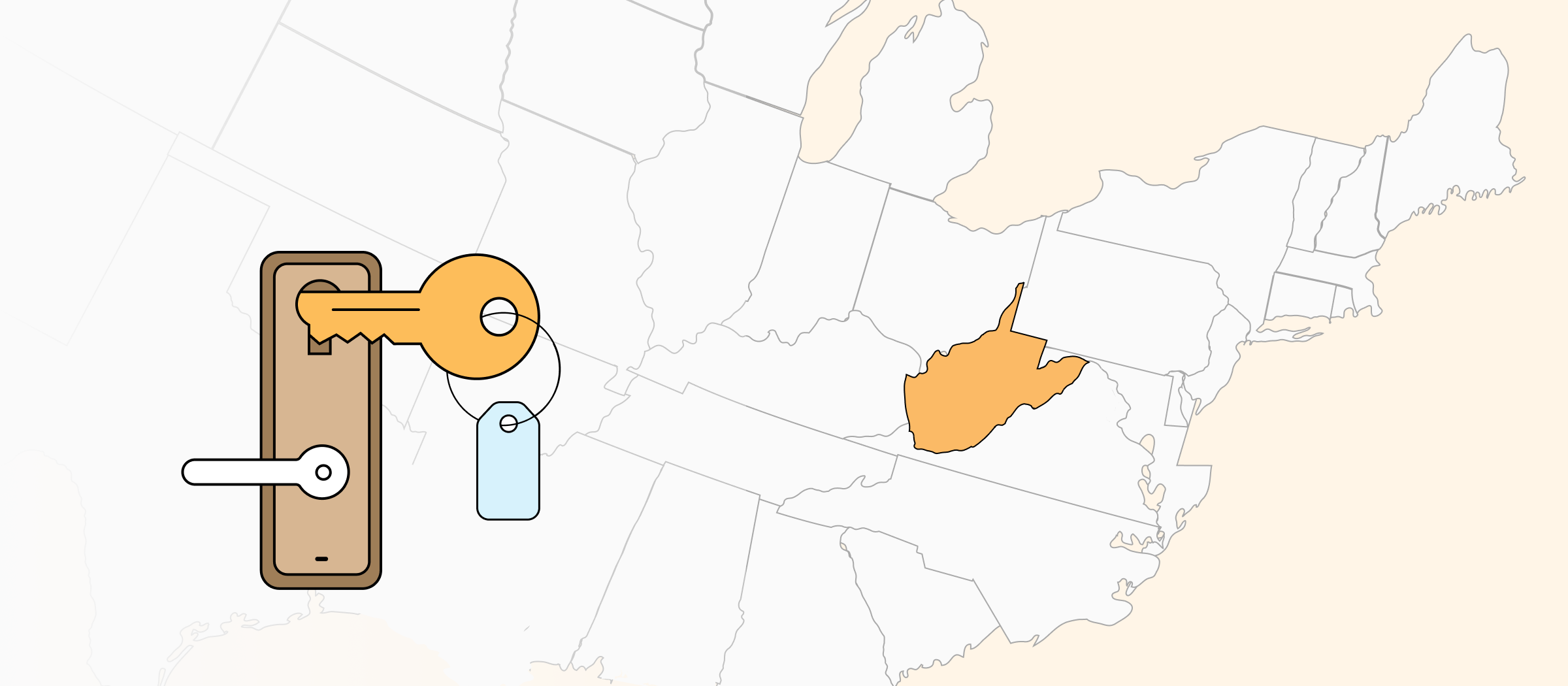| Legal Reasons for Entry |
|
| Notice Requirement |
|
| Penalties for Illegal Entry |
|
Does a Landlord Have the Right To Enter a Rental Property in West Virginia?
West Virginia landlords have the right to enter a rental property for the following reasons when terms of access aren’t otherwise agreed in the lease:
- Inspecting the property.
- Maintenance and repairs.
- Other reasonable purposes necessary for legal compliance.
- Emergencies.
Can a Landlord Enter Without Permission in West Virginia?
West Virginia landlords can legally enter a rental property without the tenant’s permission in emergencies, and, with reasonable notice, for purposes related to legal compliance (like repairs to keep the property up to code).
Can a Landlord Enter Without the Tenant Present in West Virginia?
West Virginia landlords can legally enter rental property without the tenant present.
Can a Landlord Show a House While Occupied in West Virginia?
West Virginia landlords can’t show an occupied house unless the renter agrees to showings, either in the lease or on a case-by-case basis.
How Often Can Landlords Conduct Routine Inspections in West Virginia?
West Virginia landlords have no specific limit on how often they can enter for inspections. The landlord isn’t allowed to enter unreasonably often, but what’s reasonable gets decided case by case.
How Much Notice Does a Landlord Need To Provide in West Virginia?
West Virginia landlords have to provide reasonable advance notice before entering rental property. What’s reasonable is determined case by case. As a general rule, a minimum of 24 hours is reasonable notice unless there’s a specific reason for a lesser amount.
Can a Landlord Enter Without Notice in West Virginia?
West Virginia landlords can’t enter without proper advance notice, except in emergencies or when the tenant explicitly agrees to the entry.
How Can Landlords Notify Tenants of an Intention To Enter in West Virginia?
West Virginia landlords can notify tenants verbally or in writing about an intention to enter.
Can a Tenant Refuse Entry to a Landlord in West Virginia?
West Virginia tenants can often refuse landlord entry. Landlords can enter in emergencies regardless of consent. Landlords can also enter in order to comply with legal necessities such as repairs for code compliance. Otherwise, tenants can freely refuse a landlord’s entry in most situations.
What Happens If the Tenant Illegally Refuses Entry to the Landlord in West Virginia?
West Virginia landlords can take any of the following actions if the tenant illegally refuses a valid entry:
- Get a court order to force access.
- Get a judge to modify or cancel the rental agreement.
- Recover the cost of any actual damages through a lawsuit.
Can a Tenant Change the Locks Without Permission in West Virginia?
West Virginia tenants can change locks without permission if the lease doesn’t say otherwise. Note that the landlord still has a right to enter for specific reasons, so it’s reasonable for tenants to provide copies of current keys.
What Can a Tenant Do If the Landlord Enters Illegally in West Virginia?
West Virginia tenants can take any of the following actions if the landlord enters illegally, or demands entry repeatedly and unreasonably in a way that harasses the tenant:
- Get a court order forcing the landlord to stop the unlawful entries.
- Get a judge to modify or cancel the rental agreement.
- Recover the cost of any actual damages through a lawsuit.
Sources
- 1 Teller v. McCoy, 162 W. Va. 367, 373 (W. Va. 1978)
-
West Virginia does not have a statute governing terms of access for landlords and tenants. At common law, the tenant receives a “covenant of quiet enjoyment” which is also guaranteed by statute. The protection of a tenant’s quiet enjoyment is interpreted to mean that the landlord can only enter for purposes of legal compliance (such as repairs to keep a property up to code), on reasonable notice, except in emergencies. The landlord can also enter for other purposes, but only with the tenant’s consent (which also includes the tenant’s agreement to other terms of access in the lease).
“At common law… the courts implied into leases a ‘covenant of quiet enjoyment’ to relieve a tenant from the obligation to pay rent when he was deprived of possession or disturbed by hostile claimants or defects in title. Under this doctrine, the landlord, through his acts or omissions, was deemed to ‘evict’ the tenant by depriving him of the beneficial enjoyment of the demised premises.” Teller v. McCoy, 162 W. Va. 367, 373 (W. Va. 1978) (internal citations omitted). See also W.Va. Code § 36-4-14 (2022) (“A covenant by a lessor, ‘for the lessee’s quiet enjoyment of his term,’ or a covenant of like import, shall have the same effect as a covenant that the lessee, his personal representatives and lawful assigns, paying the rent reserved, and performing his or their covenants, shall peaceably possess and enjoy the demised premises, for the term granted, without any interruption or disturbance from any person whatever.”) See further Office of the West Virginia Attorney General, Renter’s Rights: A Guide to Landlord-Tenant Rights in West Virginia 2 (2014) (“State law prohibits landlords from entering rental housing without either the consent of the tenant or providing reasonable notice in advance, unless circumstances require the landlord to perform emergency repairs.”)
Source Link - 2 Teller v. McCoy, 162 W. Va. 367, 387 (W. Va. 1978)
-
At common law, the default remedies available for a breach of contract or covenant (including rental agreements) are injunctions for specific performance (a judge forcing the offending party keep the terms of the agreement), injunctions for rescission (a judge modifying or canceling the terms of the agreement), and monetary damages. See, e.g., Teller v. McCoy, 162 W. Va. 367, 387 (W. Va. 1978) (“Since the basic contract remedies are available to tenant, the basic contract duties are imposed upon him.”)
Source Link

